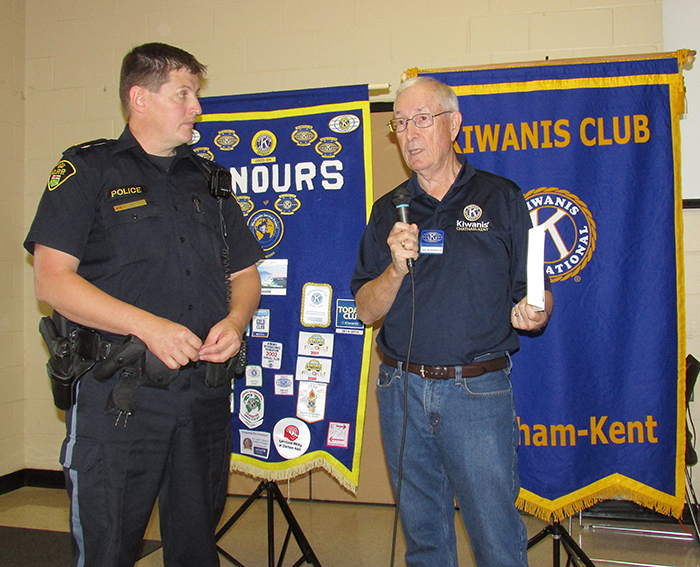
Every day across Canada, people fall victim to the many scams out there designed to part people from their money – $91 million in 2016.
And despite greater awareness, victims are still losing millions of dollars each year to a variety of scams, according to Chatham-Kent OPP Const. Jay Denorer.
Speaking at a Kiwanis Club of Chatham meeting at Holy Trinity Church hall recently, Denorer said while the elderly are commonly targeted, with technology, young people are also being targeted online.
A common scam he said criminals use is against grandparents – the emergency scam. Denorer said a caller will claim to be a grandchild in trouble, either in an accident or traveling in another country and needs money wired to them. He said even if the scam is reported to the police, the thief has picked up the money and is long gone.
“It’s all about stealing your money. Never send money to someone you don’t know and trust and never give out personal or banking info to someone over the phone,” Denorer said. “If you get a call like that, make sure you call other relatives to verify the story before you send any money.”
One of the scams that bilked people of the most money last year was the dating and romance scams. According to the Better Business Bureau of Canada, who put out a pamphlet on the top 20 scams in 2016, $17 million was lost to criminals using this method.
“Everyone wants romance and wants those three little words, ‘I love you,’” Denorer noted. “When love is in the air, you’re vulnerable. It starts with small gifts and if that goes well, then they ask for money.”
He added that in 2014, a Toronto widow was bilked out of $609,000 and recently, police broke up a scam ring of Nigerian students in Malaysia that made $11 million from Americans looking for love online.
A popular scenario is someone posing as a woman in, for example, Russia enduring hardship. The person says all the right things, and then will directly or more subtly ask for money to help them buy a plane ticket. Or it could be dating site charging you for each text, so the scammer keeps you interested with vague talk of love and desire to keep you responding. Then there is the love interest that will send you gifts and then will ask the recipients to pass on banking information so they can transfer a sum of money to them.
Denorer said it is important to do research on sites and companies to make sure they are legitimate, and check website addresses very carefully because scammers can make it look very much like the real thing.
For contests or jobs online, scammers want you to click on a link that will send a virus to your computer that can steal all your log in information, so never click on e-mail or links from people or companies you don’t know.
Denorer said the old adage, “If it’s too good to be true, it usually is” is very accurate, and people need to keep that in mind. If a charity wants your money over the phone, tell them you will look into it and call them back after you have taken the time to research it.
Identity theft is also a huge racket, and Denorer said thieves are not afraid to dumpster dive through your garbage and fill out offers for credit cards, or find personal info they can use. Tear up or shred papers and documents before you put them in the garbage, even junk mail if it is addressed to you personally.
The bottom line to keep yourself from falling victim to a scammer, Denorer said, is never give out personal or banking information over the phone or online and always do research first before signing anything. With the high-pressure, aggressive sales tactics of door-to-door sales, he said don’t let them intimidate you into letting them in the house or signing up for anything.
“If they do get in and won’t leave your house, in that case, call the police emergency line,” the constable said. “If you think you have been scammed and want to report it to the police, call the non-emergency number.”
“A big point – don’t be embarrassed to report it if you are a victim of a scam. You have trust in people and you never know who might be trying to steal your money. We have a big drug problem in Chatham-Kent and so many people out there are trying to get money to support a drug habit.”
Denorer said scammers will usually try the quick and easy way to get your money, and if you are suspicious and ask questions, they often hang up and move on to the next person.
“Once they call you, you have full control because you can hang up. If you don’t want to give them your money, say ‘no.’ Be cautious, and if you want to say ‘no,’ say ‘no.’ Don’t feel pressured.”
If you think you have spotted a scam, you can report it to the Canadian Anti-Fraud Centre at 1-888-495-8501 (antifraudcentre.ca) or the Competition Bureau info centre at 1-800-348-5358 (competitionbureau.gc.ca). Credit card or banking scams should also be reported to your financial institution.
If you believe you have been scammed, report it to the police.





